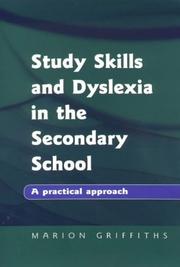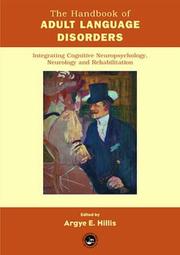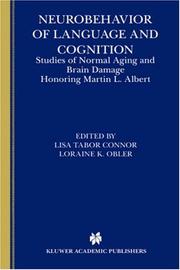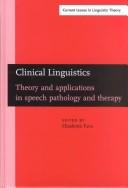| Listing 1 - 8 of 8 |
Sort by
|
Book
ISBN: 2738185495 Year: 2002 Publisher: Odile Jacob
Abstract | Keywords | Export | Availability | Bookmark
 Loading...
Loading...Choose an application
- Reference Manager
- EndNote
- RefWorks (Direct export to RefWorks)
Entre deux et trois ans, la plupart des enfants se mettent a parler. Mais pas tous. Et, pour certains, sans que l'on sache exactement pourquoi. Ce sont precisement eux que Laurent Danon-Boileau accompagne. Et parfois, au bout d'un temps assez long, quelques-uns parviennent a communiquer. L'observation reguliere du chemin qu'ils ont parcouru permet alors de repondre a ces questions centrales pour tous et pourtant toujours enigmatiques : pourquoi parler ? Que se passe-t-il ? Que cherchons-nous quand nous nous parlons ? Le temoignage d'un praticien ; les reflexions theoriques d'un psychanalyste qui est en meme temps linguiste. Laurent Danon-Boileau et therapeute au centre Alfred-Binet, professeur de linguistique a l'universite Paris-V et chercheur au Laboratoire d'etudes sur l'acquisition et la pathologie du langage de l'enfant (CNRS). Il coanime la revue Faits de langue. Il a publie L'Enfant qui ne disait rien, ainsi que plusieurs romans : La Stupeur, Romain l'egare et Un homme ficele.

ISBN: 1283709473 0203065492 113663049X 9781136630491 1853467901 9781853467905 9780203065495 9781136630569 9781136630637 9781138140035 1136630562 Year: 2002 Publisher: Abingdon, Oxon : David Fulton Publishers,
Abstract | Keywords | Export | Availability | Bookmark
 Loading...
Loading...Choose an application
- Reference Manager
- EndNote
- RefWorks (Direct export to RefWorks)
This book is aimed at those who encounter secondary school students with dyslexia on a daily basis. It takes a practical approach by breaking down the whole process of assessing the issues involved and then suggesting ways for teaching staff and students to implement a suitable program of study skills. It is well structured, clear, useful and written with the needs of busy teachers and students very much in mind. Included are assessment approaches, checklists, photocopiable activities, and suggestions for useful resources. Results from qualitative research are included to provi
Dyslexic children --- Dyslexia. --- Developmental dyslexia --- Word-blindness, Partial --- Language disorders --- Reading disability --- Alexia --- Education.
Book
ISBN: 2738109799 9782738109798 Year: 2002 Publisher: Paris Odile Jacob
Abstract | Keywords | Export | Availability | Bookmark
 Loading...
Loading...Choose an application
- Reference Manager
- EndNote
- RefWorks (Direct export to RefWorks)
Language disorders in children. --- Communicative disorders in children. --- Langage, Troubles du, chez l'enfant --- Troubles de la communication chez l'enfant --- Language disorders in children --- Communicative disorders in children --- Autisme --- Logopedie --- Communicatie --- Kinder- en jeugdpsychiatrie --- Orthophonie --- Communication --- Pédopsychiatrie --- Disorders of communication in children --- Pediatric neurology

ISBN: 1841690031 9781841690032 1134947941 0203782828 Year: 2002 Publisher: Hove Psychology Press
Abstract | Keywords | Export | Availability | Bookmark
 Loading...
Loading...Choose an application
- Reference Manager
- EndNote
- RefWorks (Direct export to RefWorks)
Language disorders --- Troubles du langage --- #KVHB:Neurologie --- #KVHB:Neuropsychologie --- #KVHB:Taalstoornissen --- Dysphasia --- Taalstoornissen --- Volwassenen --- Gedragstherapie --- Neuropsychologie --- Neuropsychologische stoornissen --- Neurologie --- Rehabilitatie --- Therapie --- Afasie --- Communicative disorders --- Taalstoornis --- Volwassene --- Verpleegkunde --- Adulte --- Aphasie --- Lecture --- Orthophonie --- Sémantique --- Language disorders - Handbooks, manuals, etc. --- Troubles du langage - Guides, manuels, etc. --- Cerebro-lese --- Neuropsychopathologie --- Phonation --- Processus cognitif --- Prononciation --- Reconnaissance de mots

ISBN: 1280043601 9786610043606 0306468980 0792378776 Year: 2002 Publisher: New York, New York : Plenum Press,
Abstract | Keywords | Export | Availability | Bookmark
 Loading...
Loading...Choose an application
- Reference Manager
- EndNote
- RefWorks (Direct export to RefWorks)
This volume has been composed as an appreciation of Martin L. Albert in the year of his 60th birthday. At least one contributor to each paper in this volume has been touched by Marty in some way; lie has mentored some, been a fellow student with some, and been a colleague to most. These contributors, as well as many others, view Marty as a gifted scientist and a wonderful human being. The breadth of his interests and intellectual pursuits is truly impressive; this breadth is reflected, only in part. by the diversity of the papers in this volume. His interests have ranged from psychopharmacology to cross-cultural understanding of dementia, through the aphasias, to the history of the fields that touch on behavioral neurology, especially neurology per se, cognitive psychology, speech-language pathology, and linguistics. Throughout his scholarly work, Martha Taylor Sarno notes, Marty never loses the human perspective, e. g. , the “powerfully disabling effect on the individual person” with aphasia or other neurological disorder. For those readers who only how a portion of his work, we thought that we should describe him here. Many of the people whom Marty has influenced have been able to contribute to this volume. We have invited some others who were unable to contribute to express their appreciation for him, as well.
Medicine. --- Neurosciences. --- Neurology. --- Cognitive psychology. --- Medicine & Public Health. --- Cognitive Psychology. --- Consciousness. --- Neurology . --- Neural sciences --- Neurological sciences --- Neuroscience --- Medical sciences --- Nervous system --- Psychology, Cognitive --- Cognitive science --- Psychology --- Medicine --- Neuropsychiatry --- Diseases --- Cognition disorders. --- Language disorders. --- Albert, Martin L.,
Book
ISBN: 2130737269 Year: 2002 Publisher: Paris (6, avenue Reille 75685) : P.U.F.,
Abstract | Keywords | Export | Availability | Bookmark
 Loading...
Loading...Choose an application
- Reference Manager
- EndNote
- RefWorks (Direct export to RefWorks)
Est-ce que les personnes âgées diffèrent des adultes plus jeunes dans leur manière de s'exprimer ? Pense-t-on que l'étendue du vocabulaire, la capacité de construire des phrases, d'organiser un récit, de tenir une conversation évoluent durant la vie adulte ? Faut-il croire que ce qui a été acquis dans l'enfance et l'adolescence se maintient tel quel ? Ces questions ont suscité de nombreux travaux et cet ouvrage présente le bilan des recherches actuelles.
Memory Disorders --- Aged --- Language Disorders --- Neurobehavioral Manifestations --- Adult --- Communication Disorders --- Behavior and Behavior Mechanisms --- Neurologic Manifestations --- Age Groups --- Psychiatry and Psychology --- Persons --- Nervous System Diseases --- Signs and Symptoms --- Pathological Conditions, Signs and Symptoms --- Diseases --- Named Groups

ISBN: 9027247358 1588112233 9786613312174 1283312174 9027275416 9789027275417 9781283312172 6613312177 9781588112231 9789027247353 Year: 2002 Volume: 227 Publisher: Amsterdam Philadelphia John Benjamins Pub.
Abstract | Keywords | Export | Availability | Bookmark
 Loading...
Loading...Choose an application
- Reference Manager
- EndNote
- RefWorks (Direct export to RefWorks)
This book covers different aspects of speech and language pathology and it offers a fairly comprehensive overview of the complexity and the emerging importance of the field, by identifying and re-examining, from different perspectives, a number of standard assumptions in clinical linguistics and in cognitive sciences. The papers encompass different issues in phonetics, phonology, syntax, semantics, and pragmatics, discussed with respect to deafness, stuttering, child acquisition and impairments, SLI, William's Syndrome deficit, fluent aphasia and agrammatism. The interdisciplinary complexity o
Speech disorders --- Speech therapy --- Applied linguistics --- Troubles de la parole --- Orthophonie --- Linguistique appliquée --- Speech disorders. --- Communicative disorders. --- Language disorders. --- Speech therapy. --- Applied linguistics. --- Linguistics --- Speech correction --- Therapeutics --- Dysphasia --- Communicative disorders --- Communication disorders (Medicine) --- Disorders of communication --- Nervous system --- Defective speech --- Disorders of speech --- Speech, Disorders of --- Speech defects --- Speech pathology --- Treatment --- Diseases

ISBN: 1107119774 1282486624 9786612486623 0511673728 0511674910 0511671660 0511670389 051151977X 0511672934 9780511674914 9780521773096 0521773091 9781107119772 9781282486621 6612486627 9780511673726 9780511671661 9780511670381 9780511672934 9780511519772 9780521022125 0521022126 Year: 2002 Publisher: Cambridge Cambridge University Press
Abstract | Keywords | Export | Availability | Bookmark
 Loading...
Loading...Choose an application
- Reference Manager
- EndNote
- RefWorks (Direct export to RefWorks)
A considerable proportion of our everyday language is 'formulaic'. It is predictable in form, idiomatic, and seems to be stored in fixed, or semi-fixed, chunks. This book explores the nature and purposes of formulaic language, and looks for patterns across the research findings from the fields of discourse analysis, first language acquisition, language pathology and applied linguistics. It gradually builds up a unified description and explanation of formulaic language as a linguistic solution to a larger, non-linguistic, problem, the promotion of self. The book culminates in a new model of lexical storage, which accommodates the curiosities of non-native and aphasic speech. Parallel analytic and holistic processing strategies are the proposed mechanism which reconciles, on the one hand, our capacity for understanding and producing novel constructions using grammatical knowledge and small lexical units, and on the other, our use of prefabricated material which, though less flexible, also requires less processing.
Lexicology --- Linguistic analysis (Linguistics) --- Language acquisition. --- Aphasia. --- Brain --- Language disorders --- Speech disorders --- Acquisition of language --- Developmental linguistics --- Developmental psycholinguistics --- Language and languages --- Language development in children --- Psycholinguistics, Developmental --- Interpersonal communication in children --- Psycholinguistics --- Analysis, Linguistic (Linguistics) --- Analysis (Philosophy) --- Grammar, Comparative and general --- English language --- Methodology. --- Diseases --- Acquisition --- Aphasia --- Language acquisition --- Language, Psychology of --- Psychology of language --- Speech --- Linguistics --- Psychology --- Thought and thinking --- Psychological aspects --- Psycholinguistics. --- Psychological aspects. --- Linguistic analysis (Linguistics). --- Lexicology. Semantics --- Pragmatics --- Arts and Humanities --- Language & Linguistics --- Lexicology - Psychological aspects.
| Listing 1 - 8 of 8 |
Sort by
|

 Search
Search Feedback
Feedback About UniCat
About UniCat  Help
Help News
News